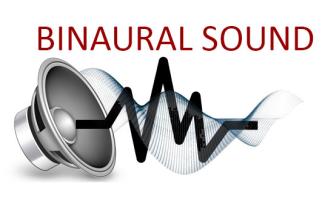
Binaural beats are a type of auditory illusion that can be used to promote relaxation and potentially help with better and deeper sleep. They are created by playing two slightly different frequencies in each ear, and the brain perceives a third, "phantom" frequency as the difference between the two. When these binaural beats are played at specific frequencies, they can influence brainwave activity and promote relaxation and better sleep.
Here's a more detailed explanation of how binaural beats work for sleep:
- Brainwave Frequencies:
- The brain operates at different frequencies, or brainwave states, depending on your mental and physical state. There are several key brainwave states: a. Delta (0.5-4 Hz): Associated with deep sleep and unconsciousness. b. Theta (4-7 Hz): Associated with deep relaxation, meditation, and light sleep. c. Alpha (8-13 Hz): Associated with relaxed wakefulness and creative thinking. d. Beta (14-30 Hz): Associated with active, alert, and analytical thinking.
- Binaural Beats:
- To induce a specific brainwave state, binaural beats are used. For example, if you want to promote deep sleep, you might use binaural beats in the delta or theta frequency range.
- When you listen to binaural beats, one ear is presented with a slightly different frequency than the other. For instance, one ear might hear a tone at 300 Hz, and the other ear hears a tone at 306 Hz. The brain perceives a 6 Hz binaural beat.
- Entrainment:
- The brain has a natural tendency to synchronize with external stimuli, a phenomenon known as entrainment. When exposed to binaural beats, the brain attempts to match its own brainwave frequency to the perceived binaural beat frequency.
- Promoting Sleep:
- When you listen to binaural beats designed to induce delta or theta frequencies, your brainwave activity may shift towards these states.
- This can help calm the mind, reduce anxiety, and prepare the body for sleep.
- People often use binaural beats in conjunction with relaxation techniques, such as deep breathing or progressive muscle relaxation, to enhance their effectiveness.
Here are some tips for using binaural beats for better and deeper sleep:
- Choose the Right Frequency: Select binaural beats that target the brainwave state you want to achieve, such as delta or theta for sleep.
- Use Headphones: To experience the binaural effect, you need to use stereo headphones. This ensures that each ear hears a slightly different frequency.
- Create a Relaxing Environment: Find a quiet and comfortable place to listen to the beats, preferably in a dimly lit room.
- Consistency: Incorporate binaural beats into your bedtime routine for the best results. Listen for at least 15-30 minutes before sleep.
- Be Patient: It may take some time for your brain to synchronize with the binaural beats, so don't expect instant results.
It's worth noting that while some people find binaural beats helpful for improving sleep, individual responses vary. Binaural beats should not be considered a cure for sleep disorders, and they may not work for everyone. If you have persistent sleep problems, it's essential to consult a healthcare professional for a proper evaluation and treatment plan.
Where can I get binaural sounds for better and deeper sleep?
You can find binaural sounds for better and deeper sleep in various places, and I'll describe them in detail:
- Online Streaming Platforms:
- There are numerous online platforms where you can find binaural sounds for sleep. These platforms offer a wide selection of audio tracks and genres to suit your needs. Popular platforms include YouTube, SoundCloud, and Spotify.
- To find binaural sleep sounds on YouTube or SoundCloud, simply use the search function and enter keywords like "binaural sleep sounds," "deep sleep binaural beats," or "relaxing sleep music." You'll discover a variety of recordings created by different content creators.
- Sleep Apps:
- There are dedicated mobile apps designed to improve sleep, and some of them incorporate binaural sounds. Popular sleep apps like Relax Melodies, Sleep Cycle, and Calm offer a range of binaural audio tracks. These apps often allow you to customize your soundscapes by mixing different elements.
- Online Sound Stores:
- You can purchase and download binaural sound recordings from online sound stores. This allows you to listen to them offline and without ads. Bandcamp is a popular platform for artists and producers to sell their original binaural sounds.
- Meditation and Relaxation Apps:
- If you're looking for binaural sounds combined with meditation and relaxation practices, consider apps like Insight Timer. These apps provide a wide selection of binaural sounds designed to induce relaxation and sleep.
When searching for binaural sounds for sleep, consider the following tips:
- Choose the Right Frequency: Think about the desired effect you want to achieve. For deeper sleep, select binaural sounds with lower frequencies, such as delta or theta waves.
- Experiment with Different Recordings: Each recording may have a different effect on your sleep, so try several binaural soundtracks to discover what works best for you.
- Use Quality Headphones: To experience the full binaural effect, it's important to use high-quality stereo headphones.
- Create a Relaxing Environment: Choose a quiet and comfortable space for listening to binaural sounds to enhance their impact on your sleep.
- Pay Attention to Individual Responses: Everyone is unique, and your response to binaural sounds may vary. Listen to your body and find what works best for you.
Binaural sounds can be a valuable tool for improving sleep and relaxation. However, it's important to note that they are not a magic solution, and individual responses may differ. If you have persistent sleep issues, consider consulting a sleep specialist or therapist for advice and additional assistance with sleep management.






